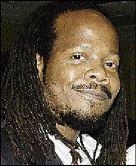Making money from music
Published: Sunday | July 19, 2009

File
Steven Golding, chairman of the Jamaica Association of Composers, Authors and Publishers.
Avia Collinder, Business Writer
Under copyright laws, songs aired in Jamaica earn the songwriters registered with the Jamaica Association of Composers, Authors and Publishers (JACAP) an estimated J$30 million per year.
But the money represents a portion of the song royalties generated, and even the money collected by the JACAP does not all go to local talent.
"The money is not only for Jamaican writers," says Steven Golding, chairman of the JACAP.
Songwriters may register with a music society of their choosing, which means that not all registered Jamaican songwriters are on the JACAP's roll of members, and similarly, the society would also have foreigners on its membership list.
Part of a network
Jamaica is part of a network of societies, said Golding, that includes the American Society of Composers, Authors and Publishers (ASCAP), Broadcast Music Incorporated (BMI) - both in the United States - the Performing Rights Society Limited, London, (PRS), the Society of Composers, Authors and Music Publishers (SOCAN) in Canada, and "everyone whose music is played in Jamaica - local or international".
Songwriters are paid by whichever society they are registered with.
"There are 218 societies of which we are one," the JACAP chairman said.
And of the copyright-generated revenue on songs, only 20 per cent goes to Jamaicans, he tells Sunday Business.
"There are at least - based on our information - 4,000 songwriters locally who are members of copyright societies. Of that number, 1,700 are members of the JACAP," Golding said.
"We cannot pay Jamaican writers who are members of foreign societies."
The income received by the JACAP represents earnings from publishing rights, or the rights of creators of musical works and publishers here in Jamaica and abroad.
Fees collected from 'music users' in Jamaica are distributed to these creators, which includes writers and their representatives - the publishers.
"JACAP has been averaging approximately J$30 million over the past three years - 2006 to 2008," said Golding, son of Prime Minister Bruce Golding.
But there is still an untapped area - online sales - that the society is examining to potentially grow those royalty revenues.
"We are looking at the best practices in this area. Outside of the biggest publishers in the world, this is still a grey area," he said.
To date, no licensing for using music online has been issued, although JACAP says it has the capability to do this.
Songwriters also earn additional income from the interest earned when funds collected by the JACAP are banked or otherwise deposited before distribution.
The JACAP is a music copyright administration society, established in 1998 and incorporated in 1999, with the support of the PRS, which operated an agency office in Jamaica for over 60 years.
The JACAP's members, like those of similar societies worldwide, are songwriters and music publishers.
Its administrative function covers the full repertoire of local and international songwriters (rights holders), who are members of affiliated societies.
Collective-management organisations
Societies, like the JACAP, are also called collective-management organisations, or CMOs.
This means that members form a 'collective', which collects the fees from music users and makes payments to the rights holders.
Those who pay publishing fees to the JACAP locally include users airing in live, recorded or broadcast format.
Such fees become due under circumstances where the music can be heard by members of the public, is a public performance under the law, and is payable by any person, group of persons, institution or organisation that facilitates the performance/hearing of copyright music, live or recorded, in public.
The categories of users include, but are not restricted to, broadcasters, cable operators, show and party promoters, hotel and club owners and operators, sound systems and discotheque operators, ring-tone providers and operators of any place where piped music is heard, for example restaurants, bars, salons and indeed, even 'music on hold' services.
The JACAP says it has inspectors trained in the business of licensing. They ensure users are issued a certificate of compliance, which they may display, if they choose.
avia.collinder@gleanerjm.com
According to the Jamaica Music Commission, a unit of Jamaica Trade and Invest, money or royalty is generated each time a song is used.
There are 12 intellectual property rights and 12 possible streams of income issuing from copyright ownership of music.
There are two different components of a song: the lyrics, and the underlying musical composition.
Six separate rights also exist in each component:
1. The right to make copies of a work that is fixed in practically any form, including CDs, records and sheet music.
2. The right to distribute the copyrighted work to the public by sale or other transfer of ownership/possession.
3. The right to display images of a work, such as projecting it on a screen.
4. The right to perform the copyrighted work publicly.
5.The right to make derivatives based on original work, such as translations, motion-picture adaptations, sound recordings, etc.
6. The right to digital performance of sound recording audio transmission.
The work may be transferred in whole or in part to a music publisher who may then own the rights in the work and pay the writer his/her share of earnings.
Copyright in a work in Jamaica continues for the lifetime of the author/writer, plus a period of 50 years thereafter.
The writer/author may opt to retain ownership - this is advisable - and hire a co-publisher just to do the administrative work.
A sub-publisher administers rights in another country/territory.
Information on intellectual property rights and copyright is available from the Jamaica Intellectual Property Office.





















